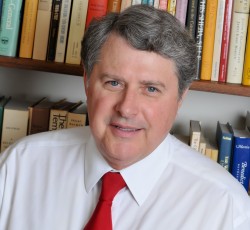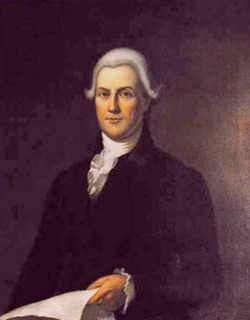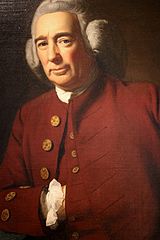Since I was on a Battle of
Monmouth kick, I’ll jump to one of the most enduring American legends to come out of that fight: Molly Pitcher.
As Ray Raphael wrote in
Founding Myths and
this article for the Journal of the American Revolution, there’s solid evidence of a
woman helping her husband in the Continental
artillery at that battle. In his memoir, first published in 1830, army veteran
Joseph Plumb Martin wrote:
A woman whose husband belonged to the artillery and who was then attached to a piece in the engagement, attended with her husband at the piece the whole time. While in the act of reaching a cartridge and having one of her feet as far before the other as she could step, a cannon shot from the enemy passed directly between her legs without doing any other damage than carrying away all the lower part of her petticoat. Looking at it with apparent unconcern, she observed that it was lucky it did not pass a little higher, for in that case it might have carried away something else, and continued her occupation.
There’s also contemporaneous documentation of the state of Pennsylvania awarding a pension to Margaret Corbin, who took her husband’s place at a cannon during the defense of
Fort Washington in 1776.
But the specific legendary figure we’ve come to know as Molly Pitcher first showed up in the second volume of Freeman Hunt’s 1830 collection
American Anecdotes:
Before the two armies, American and English, had begun the general action of Monmouth, two of the advanced batteries commenced a very severe fire against each other. As the warmth was excessive, the wife of a cannonier constantly ran to bring him water from a neighbouring spring. At the moment when she started from the spring, to pass to the post of her husband, she saw him fall, and hastened to assist him; but he was dead. At the same moment she heard an officer order the cannon to be removed from its place, complaining he could not fill his post by as brave a man as had been killed. ‘No,’ said the intrepid Molly, fixing her eyes upon the officer, ‘the cannon shall not be removed for the want of some one to serve it; since my brave husband is no more, I will use my utmost exertions to avenge his death.’ The activity and courage with which she performed the office of cannonier during the action, attracted the attention of all who witnessed it, finally of Gen. Washington himself, who afterwards gave her the rank of Lieutenant, and granted her half pay during life. She wore an epaulette, and every body called her Captain Molly.
Five years later the story was in print again, in two sources, one of which I don’t think has been discussed before.
A Popular Cyclopedia of History, an oft-reprinted reference book compiled by Francis Durivage, stated:
In the beginning of this battle [of Monmouth], one Molly Pitcher was occupied in carrying water from a spring to a battery, where her husband employed in loading and firing a cannon. He was shot dead at last, and she saw him fall. An officer rode up, and ordered off the cannon. “It can be of no use, now,” said he. but Molly stepped up, offered her services, and took her husband’s place, to the astonishment of the army. She fought well, and half pay for life was given her by Congress. She wore an epaulette, and was called Captain Molly, ever after.
And here’s a source I don’t think anyone has spotted before, also from 1835:
Allgemeine Beschreibung der Welt [General Description of the World] published in Philadelphia. This book was credited to E. L. Walz with editing by Heinrich Diezel of Lebanon County, Pennsylvania. It was printed in old Gothic type, and I’ve never studied
German. I’m therefore at the mercy of Google’s O.C.R. transcription and translation services, but this is what I think
that book says:
In Monmouth County siel im Revolutionskriege eine Geschichte vor, welche noch immer häufig in N. I. erzählt wird: Die Amerikaner unter Washington, und die Engländer unter Henry Clinton, schlugen sich hier wasser herum. Es war an diesem Tage heiß und schwühl. Mitten in der Schlacht sah man eine Frau, Molly Pitcher, die einigen Artilleristen Wasser zutrug, unter denen auch ihr Mann sich befand. Von einer Kanonenkugel getroffen, stürzte er leblos nieder. Molly that nun, was 1000 andere Weiber nicht gethan haben würden. Statt zu weinen, stellte sie sich an die Stelle des Gefallenen und versah mit wahrem Heldenmuthe seine Dienste. Sie kam glücklich davon. Von dieser Zeit an behielt sie bis zu ihrem Tode den Namen: Major Molly.
[From Monmouth County in the revolutionary war fell a story which is still frequently told in N.J.: The Americans with Washington, and the English under Henry Clinton, this also reflected around water. It was hot and schwühl on this day. In the midst of the battle some artillerymen saw one woman, Molly Pitcher, that was happening water in which her husband was. From a cannonball hit, he fell down lifeless. Molly now did what 1000 other women would not have done. Instead of crying, she stood in the place of the dead man and adorned with true heroism his services. She got off lucky. From that time on she kept until her death the name: Major Molly.]
It’s notable that the story penetrated the German-American community so early. That might lend credence to the interpretation that the real Molly Pitcher was Mary (Ludwig) Hays, the daughter of German
immigrants to Philadelphia. On the other hand, Mary Hays settled in Carlisle, Pennsylvania, after the war, and lived until 1832, a local character who also received a state pension. So it’s a little surprising that this book’s source for the story seems to come from New Jersey rather than two counties away.
Clearly this anecdote grew in the telling. Mary Hays was supposedly called “Sergeant Molly” after the battle and later in life. In these early sources the corresponding detail became “the rank of Lieutenant” and “Captain Molly,” then “Major Molly.” There’s no documentation to support the claims that this woman received such a rank or a pension from “Gen. Washington himself” or the Congress. But clearly by the 1830s Americans of many sorts were telling the story of Molly Pitcher.
TOMORROW: But there already was a famous Molly Pitcher.




